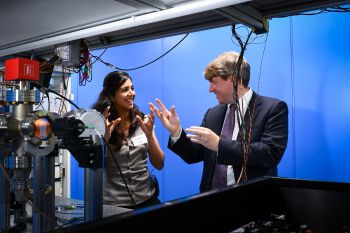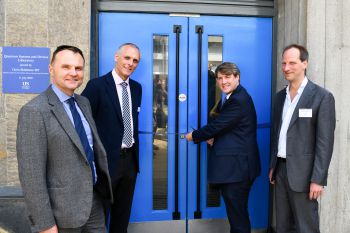News
Science Minister comes to campus to announce funding for two University of Sussex quantum groups
By: Anna Ford
Last updated: Thursday, 11 July 2019

PhD student Shobita Bhumbra explains quantum sensing to Chris Skidmore MP

Chris Skidmore MP opens the Quantum Systems and Devices lab accompanied by Prof Adam Tickell, Phillip Harris and Prof Peter Kruger
Chris Skidmore MP, the Minister for Science, came to the University of Sussex on Thursday 11 July, to announce fresh funding for two of our quantum groups.
Mr Skidmore also officially opened the Quantum Systems and Devices Laboratory which is home to Professor Peter Kruger’s team. The Minister attended the #SussexLovesQuantum event on campus which formally launched the Sussex Programme for Quantum Research, run by Professor Alan Dalton and Professor Peter Kruger. Guests at the event included broadcaster and scientist Professor Jim Al-Khalili.
From the #SussexLovesQuantum event, Mr Skidmore announced £94 million of Government investment for quantum researchers in the UK National Quantum Technology Hubs across various universities. The two Sussex quantum hubs to receive the new funding are the Quantum Sensing and Timing hub and also the Quantum Computing and Simulation hub.
Professor Adam Tickell, Vice Chancellor at the University of Sussex, said: “We’re delighted that Chris Skidmore MP has come to the University of Sussex to announce further investment in the UK National Quantum Technology Hubs. The quantum physicists at the University of Sussex are involved in two of these hubs: the Quantum Sensing and Timing hub and also the Quantum Computing and Simulation hub.
"At Sussex, we work to push the boundaries of science and also to solve real world problems, now. That involves developing ideas alongside commercial industry partners. In fact, today we’re announcing a new breakthrough which we developed in collaboration with industry: quantum physicists at the University of Sussex have, for the first time, successfully taken live images of the inside of a working electric car battery from the outside, using quantum magnetic sensing technology.
"This paves the way for speedier development of better electric car batteries, and means that quick non-invasive ‘battery MOTs’ will soon be possible. It could represent a transformative moment in the race to make electric cars mainstream.”
The Quantum Technology Hubs are the route in for businesses to access skilled experts that can help them to innovate for the future. The Government says that the hubs are already working with more than 200 businesses and 20 universities and this new support will see that continue.
Science Minister, Chris Skidmore MP, said: “Harnessing the full potential of emerging technologies is vital as we strive to meet our Industrial Strategy ambition to be the most innovative economy in the world. Our world-leading universities are pioneering ways to apply quantum technologies that could have serious commercial benefits for UK businesses. That’s why I am delighted to be announcing further investment in Quantum Technology Hubs that will bring academics and innovators together and make this once futuristic technology applicable to our everyday lives.”
Professor Winfried Hensinger works with Professor Mattias Keller in the Quantum Computing and Simulation hub. Prof Hensinger said: “This funding via the National Quantum Technology programme will help us to develop a new generation of quantum computers that are powered by microwave technology such as used in mobile phones. The use of microwaves, replacing laser beams which were previously used to execute computations, has the potential to enable the construction of practical machines featuring unprecedented computational power.”
Professor Mattias Keller said: “Distributed quantum computing and quantum networks have the potential to revolutionize the way we use computers and communicate. The continued funding through the National Quantum Technology programme will allow us to continue our research in this area.”
Professor Peter Kruger added: “We are delighted to continue to be part of the renewed Quantum Technology Hub for Sensing and Timing. It is exciting to expand our work on magnetometry to imaging devices with use in healthcare, electric vehicle and navigation applications.”
Speaking about his breakthrough on taking images of the inside of electric car batteries from the outside announced today, he said: “Our breakthrough will speed up the development of new electric car batteries because researchers will be able to identify what’s working well within their batteries, and what isn’t, in a much more efficient way. Currently electric car batteries account for a large proportion of the cost and weight of the car. This shows how urgent it is that better electric car batteries are developed quickly, so that the UK can achieve its aim of moving from fossil fuel to electric cars within decades.”

